Applying for Election Observation Missions
ZIF is your German partner in the field of election observation - we recruit, train and deploy about 300 election observers per year.
Become part of election observation – support democratic processes worldwide!
ZIF is the central point of contact for German election observers worldwide. Every year, we send over 300 committed election observers of different ages, backgrounds, and experiences on missions.
Each year, we look for around 20 new faces for our two election observation training courses.
Your opportunity to promote democracy
As an election observer, you will observe election day on site. You will work in an international team and learn about a variety of perspectives. We are looking for people who are curious, open-minded, and willing to volunteer as short-term observers for 7 to 14 days in international election observations.
You can also apply if you are already in the ZIF pool in another area (peace or humanitarian missions). There is a separate procedure for this, which is described under “Important information about the application.”
Become part of election observation – support democratic processes worldwide!
ZIF is the central point of contact for German election observers worldwide. Every year, we send over 300 committed election observers of different ages, backgrounds, and experiences on missions.
Each year, we look for around 20 new faces for our two election observation training courses.
You can apply from January 1 to 29 2026! Applications can only be submitted via our online ventus portal.
Your opportunity to promote democracy
As an election observer, you will observe election day on site. You will work in an international team and learn about a variety of perspectives. We are looking for people who are curious, open-minded, and willing to volunteer as short-term observers for 7 to 14 days in international election observations.
You can also apply if you are already in the ZIF pool in another area (peace or humanitarian missions). There is a separate procedure for this, which is described under “Important information about the application.”
What do I need to bring?
We will review your application documents using standardized application criteria. These are also based on the specific requirements of OSCE/ODIHR and the EU. We base our selection on the following general profile requirements:
- Interest in democratic processes and willingness to engage with different countries and cultures;
- Experience as an election worker;
- Volunteer work;
- Very good German and English skills (C1 or higher);
- Class B driver's license and driving experience;
- Completion of the ODIHR Election Observation e-learning course
What increases my chances of being selected?
- Intercultural or international experience – within or outside crisis and conflict regions;
- Knowledge and/or involvement in the field of elections and democratization;
- Completed training or degree (BA);
- Technical and language skills such as MS Office or other languages (e.g., French, Portuguese, Russian, Spanish, or Arabic);
- For travel logistics reasons: Residence in Germany or in a European country close to the border.
What does "short-term election observation" mean?
Short-term election observation is an honorary position. As a Short Term Observer (STO), you accompany the events on election day. You will travel to the capital of the mission country approximately four days before the election and receive a detailed briefing from the so-called Core Team (information on the Core Team can be found here).
Subsequently, all STOs travel (in multinational teams of two) to their respective mission area. On election day, STO teams visit up to twelve polling stations, collect statistical data and observe the situation in the area of operation. The period of deployment is between 7 and 14 days.
STO field of activity:
- Independent preparation for the cultural and political conditions of the country of deployment
- Participation in all briefings of the mission
- Observation of the election process on election day, from the opening of the polling stations to the counting of the votes during the night
- Reporting of the collected data to Core Team and long-term election observers (LTOs)
- Observation of the tabulation and publication of election results
- The Core Team is the heart of every election observation mission. Up to 14 experts are on site for several months. They provide analysis around the election and also organize the deployments of LTOs and STOs on the ground. More information can be found here.
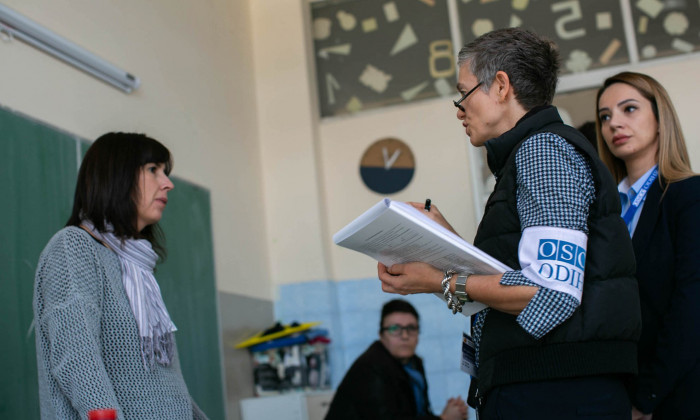 ©OSCE/Maria Kuchma
©OSCE/Maria Kuchma
The Core Team is the heart of every election observation mission. Up to 14 experts are on site for several months. They provide analysis around the election and also organize the deployments of LTOs and STOs on the ground. More information can be found here.
What does "long-term election observation" mean?
Long-term election observation is based on a fixed-term employment contract with ZIF. As a Long Term Observer (LTO), you work fulltime for between four weeks to three months in an election observation mission. Travelling throughout the area of operation, you will be the eyes and ears of the mission in the various regions. LTOs also work on the ground in multinational teams of two.
In addition to observing election day, LTO teams analyze the local political context and the election campaign in advance. They meet responsible persons from politics, media or NGOs in their region and report regularly to the Core Team. Likewise, the preparation, organization and monitoring of the STO teams falls within the scope of the LTOs' work.
Specific profile requirements for LTOs
- Member of the ZIF Expert Pool of the field election observation
- At least three fulfilled assignments as STO in OSCE/ODIHR or EU election observation missions
- Application and successful participation in the training course for LTOs
LTO field of activity:
- Independently prepare for cultural and political conditions of the country of assignment
- Participation in all briefings of the mission
- Meetings and discussions with responsible persons in media, NGOs, political parties, election administration and other important actors in the area of operation
- Accompaniment and observation of election preparations, e.g. registration of candidates and voters
- Observation of the regional election campaign
- Writing weekly situation reports from the respective area of operation for the core team
- Coordinating the deployment of STO teams in the respective area of operation
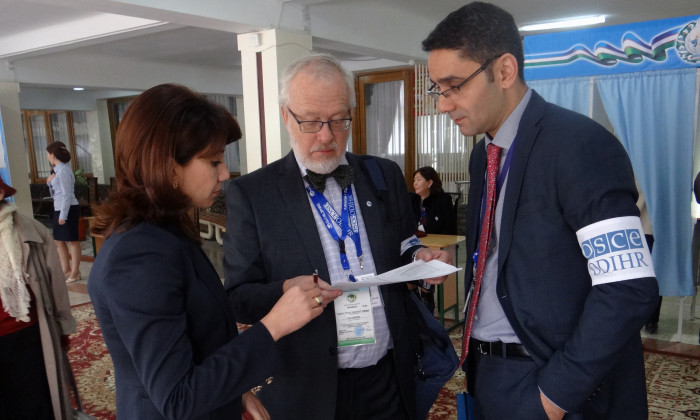 ©OSZE/Thomas Rymer
©OSZE/Thomas Rymer
Your path to deployment
The application process for election observation assignments consists of two steps: In the first step, you complete the admission procedure for the ZIF Expert Pool for the area of competency of election observation. In the second step, you apply through ZIF for a specific activity in an election observation mission.
Step 1: Become a member of the ZIF Expert Pool
You have looked through our application requirements and have the required knowledge and skills?
Then get introduced to the topic and complete the free online course offered by our partner organization OSCE/ODIHR. Participation in this course is a prerequisite for an application.
OSCE/ODIHR Online Training
This training is free and available here: Election Observation E-Learning Course .
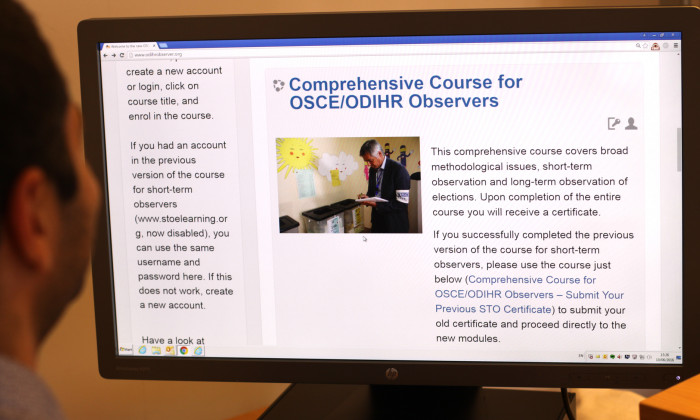 ©OSZE/Francesco Marchesano
©OSZE/Francesco Marchesano
Online Application ZIF Expert Pool
We usually open the ZIF Expert Pool for the area of election observation once a year. The next application period will be in 2026 - you will then find the open call on our website and on ventus.
We evaluate all applications and invite particularly suitable candidates to the preparation course. We also ask you to submit a current police clearance certificate.
Preparation Course
The four-day ZIF training course for STOs is the final step in the application process to join the ZIF Expert Pool for Election Observation. The course provides specific knowledge and skills to prepare you for your first STO assignment. We also provide comprehensive information about your future deployment opportunities in international election observation missions in a course module. The course offers the opportunity to get to know each other and to assess the German participants.
- Two ZIF STO training courses per year
- Ten German and ten international participants per course
- Course language is English
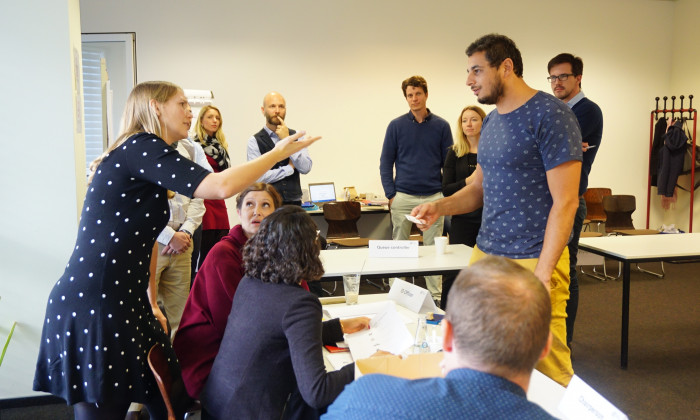 ©ZIF, STO-Kurs
©ZIF, STO-Kurs
Congratulations: You are now a member of the ZIF Expert Pool
You have mastered the selection process and are now a member of the ZIF Expert Pool in the competence field of election observation. You will receive access to the ZIF member area and can apply for advertised STO positions in an election observation assignment with your ventus profile. In addition, the ZIF networks will provide you with further information and networking opportunities.
Step 2: Apply for election observation missions
You can find all open calls on our website as well as on ventus.
We publish the calls for application tenders on our website and on ventus.
In order not to miss any pool openings or calls for applications, we recommend you set up a customized job and training alert on ventus, set preferably to update on a daily basis.
Most of our election observers start with an OSCE/ODIHR assignment. The OSCE observes elections in OSCE participating States. The EU observes certain elections in other countries upon invitation.
OSCE/ODIHR Election Observation Missions
Apply
Once you have been accepted into the ZIF Expert Pool, you can apply for an OSCE/ODIHR mission at any time and as often as you are available. You can easily apply online via ventus. We accompany you in all phases of your STO assignment: preparation, deployment and return.
Our criteria for selection for OSCE/ODIHR missions:
- Membership in the ZIF Expert Pool in the field of election observation
- Registration in the OSCE/ODIHR database for election observation
- Language, country or regional knowledge is desirable
EU Election Observation Missions
Apply
EU election observation missions work with a smaller mission team than OSCE/ODIHR and select their own election observers. EU member states can only propose persons for missions - for Germany, ZIF takes on this task on behalf of the Federal Foreign Office.
Our criteria for selection for EU missions:
Membership in the ZIF Expert Pool area election observation
- At least three STO assignments in OSCE/ODIHR missions
- Language, country or regional knowledge
- Registration in the EU database for election observation
- Other criteria we consider when selecting candidates for deployment:
- 50% men and 50% women
- Persons of different age groups
- Newcomers and experienced STOs
- Residence in Germany or abroad close to the border
Den Link zur Registrierung in der OSZE/ODIHR-Datenbank für Wahlbeobachtung finden Sie in jeder Wahlbeobachtungsausschreibung.
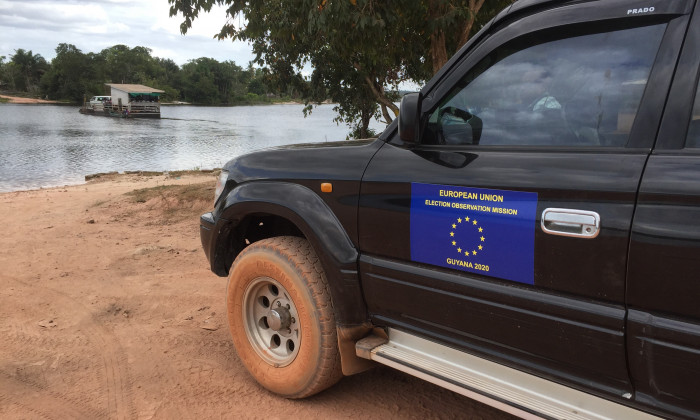 ©ZIF/Rebecca Meier
©ZIF/Rebecca Meier
Further training: how to become an LTO
After at least three EU or ODIHR assignments, you can apply for the ZIF advanced training course for long-term election observers (LTOs). This course qualifies you for the much broader scope of LTO duties. The course is offered once a year, in English only. All information about application deadlines and course content can be found here (LINK). Apply directly via your ventus profile.
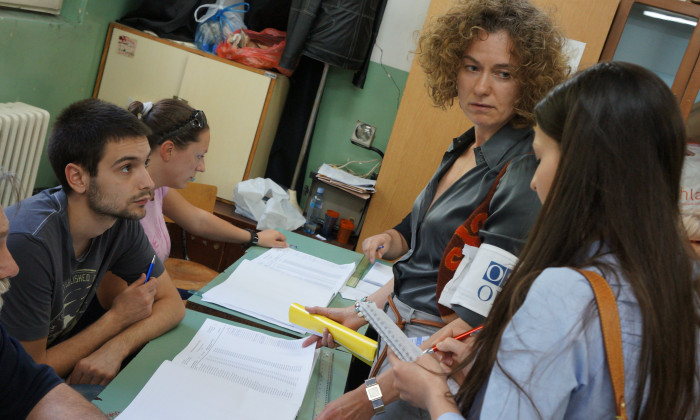 ©OSCE/Shiv Sharma
©OSCE/Shiv Sharma
Important information about the application
ZIF Expert Pool
The ZIF Expert Pool comprises pre-selected and pre-qualified personnel who can be seconded into different areas of deployment and tasks. In the ZIF Expert Pool we accept experts for three different areas of competence: for peace operations, for humanitarian operations, and for election observation operations. Different application procedures, selection processes and application deadlines apply for these three areas of expertise. It is also possible to apply for several areas of competence.
We provide information on the respective application process and application deadlines on our website (LINK to positions in missions) and directly on ventus.
More information on
- our application page for peace operations
- our application page for humanitarian missions
Next application period
January 1 to 31, 2024
You are already a member of the ZIF Expert Pool in the field of peace operations or humanitarian missions and you are interested in becoming an elective observer?
We usually offer the so-called " Remote STO Course " once a year as further training for members of the ZIF Expert Pool. We will inform about the next date and the application procedure in due time in the ZIF members area.
Contact
Rebecca Meier
What We Offer
During your assignment in an OSCE/ODIHR Election Observation Mission, ZIF is your contact and contractual partner. Your benefit package depends on the type of assignment.
In case of an election observation mission with the EU, the EU is your contact and contractual partner. For further information, please click here.
As a short-term election observer (STO), you will work full-time on a voluntary basis and will receive a secondment contract in accordance with the German Secondment Act.
As a long-term election observer (LTO), you will work full-time. You will receive a fixed-term employment contract with us based on the Secondment Act. We offer you a comprehensive support and benefits package before, during and after your assignment.